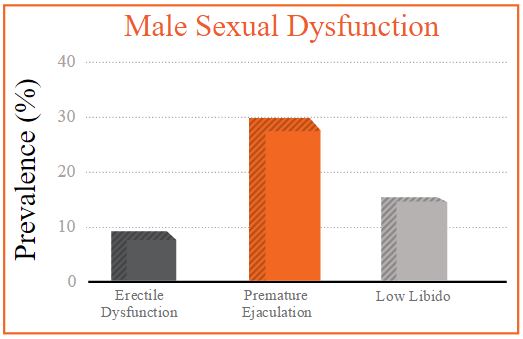Sexual disorders are dysfunctions that prevent one or several partners from enjoying sex and / or performing a reproductive function. There are four key components of male sexual function: libido, erection, ejaculation, and orgasm. Dysfunction occurs when the operation of at least one of these components is disrupted.
1. Low Libido
This component of sexual function is highly dependent on the hormonal status, it is responsible for sex drive, thoughts about sex, which arise spontaneously or as a response to various erotic stimuli.
The level of libido can be affected by hereditary hormonal diseases, the use of certain medications (antidepressants, weak androgen receptor antagonists, etc.). As a result, a man’s desire to have sex is reduced, and he also begins to think less about it. Hypo-libidemia can indirectly cause erectile dysfunction.
It should be noted that drugs for the treatment of erectile dysfunction (Viagra, Cialis, etc.) do not lead to an increase in libido, they simply act locally, improving blood circulation in the penis.

2. Erectile Dysfunction
Erectile dysfunction (ED) is a medical diagnosis indicating a disorder when a man cannot achieve an erection necessary for normal sexual intercourse. Previously, it was often called impotence, but now this word is out of use due to its certain inaccuracy and insulting nature.
ED can be complete (when the penis remains almost completely flaccid) or partial when the penis becomes hard, but not enough or for too short a period of time. An erection is a neurovascular response to tactile or psychological stimuli. It occurs due to a rush of blood in the penis and a reduction in venous outflow. Erectile dysfunction can be caused by various reasons, including psychological (mental), vascular, nervous, etc. The above-mentioned medications (Viagra and others) improve blood flow and help in most cases of erectile dysfunction, both psychogenic and organic ones.
3. Ejaculation Disorders
The processes of ejaculation are controlled by the sympathetic division of the nervous system. It involves adrenergic receptors in epididymides, vas deferens, other organs and parts of the male reproductive system.
Premature ejaculation is the most common sexual disorder. It often develops at a young age but usually goes away on its own with the gain of sexual experience. But older men can also suffer from early ejaculation and the reasons can be not only psychological. With premature ejaculation, a man quickly feels arousal and ejaculates (for example, less than 1-2 minutes after the onset of sexual intercourse).
Dapoxetine is the only drug specifically approved for the treatment of premature ejaculation, but doctors may also prescribe antidepressants to treat this disorder, since dapoxetine medications are not approved in all countries.
Read more:Premature Ejaculation Treatment
Delayed ejaculation is another disorder of this kind. A man with this condition cannot reach orgasm for a long time.

4. Orgasm Disorders
Orgasm disorders are less common than ejaculation disorders (orgasm and ejaculation are not identical things). Orgasm is an explosive sensation of pleasure that occurs in the brain, usually at the same time as ejaculation.
Orgasm disorders include:
- bradyorgasmia (rare orgasms that occur with considerable effort)
- anorgasmia (there is no orgasm at all)
- hypo-orgasmia (orgasms which are not bright or sharp cause ?blurry’ sensations)
A rare disorder is urinary orgasm, during which urine is released.
5. Pain Disorders
Pain during sex is less common in men than in women. However, some patients may have pain during frictions. To identify the cause, a comprehensive diagnosis is needed, possibly an ultrasound examination of the penis. In accordance with the diagnosis, an appropriate treatment is prescribed.
Sexual bias, even in a fairly informed modern society, often becomes an obstacle to seeking medical help. Regarding sexual dysfunctions as a shame, a prejudiced man tries to cope with the problem on his own. This often does not produce a result and even exacerbates the problem. Therefore, take the time and consult a doctor, there is nothing shameful about this.


Leave a Reply